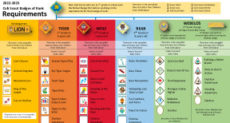 A generation ago, a major shakeup took place in American culture. Up until then, many Americans participated in a very common activity, part of our everyday lives. Almost every public figure, especially in the relatively new medium of television, did it, from Edward R. Murrow and Groucho Marx to, believe it or not, Santa Claus. That activity was cigarette smoking. The question in the 1950s was not whether you smoked, but which brand, and whether it was plain, filter or menthol. Candy cigarettes were sold to children, complete with a bit of red dye at the end to simulate the burning tobacco. My parents smoked until I was about five years old, and it was probably the sight of me playing with their cigarettes that caused them to seriously consider the effect their smoking was having on my sister and me.
A generation ago, a major shakeup took place in American culture. Up until then, many Americans participated in a very common activity, part of our everyday lives. Almost every public figure, especially in the relatively new medium of television, did it, from Edward R. Murrow and Groucho Marx to, believe it or not, Santa Claus. That activity was cigarette smoking. The question in the 1950s was not whether you smoked, but which brand, and whether it was plain, filter or menthol. Candy cigarettes were sold to children, complete with a bit of red dye at the end to simulate the burning tobacco. My parents smoked until I was about five years old, and it was probably the sight of me playing with their cigarettes that caused them to seriously consider the effect their smoking was having on my sister and me.
It took the herculean efforts of United States Surgeon General C. Everett Koop to turn popular thinking, public policy, entrenched commercial interests and even the medical community around. Scientific proof showed that thirty percent of cancer deaths and an even greater number of heart-related deaths were attributable to smoking. In what seems obvious to us today, smoking posed an even greater hazard than air pollution, coal dust and asbestos inhalation, then seen as major occupational health issues.
In what would seem impossible to do today, given our current political dysfunction, Dr. Koop was able to start a movement that resulted in federal regulations, legislation and social behavior modification to reduce the numbers of smokers and improve public health in spite of being outspent 4,000 to one by the tobacco industry and its powerful lobbying.
We now live in a nation where smokers are a much rarer sight. Our restaurant meals and workplaces are no longer fouled by our fellow diners and co-workers puffing away. We are keenly aware of the health risks not only of smoking but breathing the secondhand smoke, and of air pollution in general.
Now that one major public health nuisance has been somewhat brought under control, we face another issue that many are saying is equally hazardous to our health, the effects of which are almost entirely preventable as well. And Scouting has a role in fostering that behavior change in our youth.
The health hazard that’s hastening our demise? Â Lack of physical activity.
Your doctor tells you that you need 30 minutes of moderate activity every day, but how many of us actually get that much? Â A great many of us work at a desk, or sit in meetings, or drive a vehicle most of our work days. We average more time sitting than sleeping. In the evening when we get home, we sit in front of the television set or computer, either doing more work, playing games or engaging each other not by physical means but in social media outlets. Sitting has been called “the smoking of our generation” in an article by author and consultant Nilofer Merchant (Harvard Business Review, free registration required). Merchant offers statistics on the physiology of sitting, describes the increased health risk factors associated with inactivity, and gives some very interesting ways to keep moving at the workplace and at home. Her article is inspirational and I encourage you to read it.
But more than the time adults spend in sedentary activity, our youth are particularly at risk for developing poor physical habits. They sit in classrooms all day. At home they sit and play games on the computer or television. What does your son or daughter do when they get home from school? Unless they are participants in some sort of organized sport (where they may even merely warm the bench), most of our youth are learning that sitting still is the norm.
The Scout Oath extols us to be physically strong. The outdoor program involves much physical activity. We hike, we camp, we ride bikes, we swim. Scouting recognizes the need for physical activity as part of a healthy lifestyle. Scouting happens, not in a classroom, but hands-on and active. Our meeting room is the great outdoors and our Scouts are uniquely positioned to have an appreciation of it and the skills to put it to good use for their own betterment.
A side benefit to involving our youth in healthful physical activity is that we ourselves get involved in many of the same activities – rowing, climbing, hiking – and not only derive the benefits but augment our skill set so these activities don’t seem as daunting. They’re things we can do, and by doing them we’re providing the antidote to all that sitting that we’re often stuck doing at work.
Baden-Powell said that Scouting shouldn’t be like school. A boy needs to get outdoors and appreciate nature’s beauty and wonder. We provide the keys to that great outdoor kingdom and pass them down from our generation to theirs.
And wouldn’t it be wonderful if a generation from now, we look back on the early 21st century and wonder why we just sat around so much?
Image by imagerymajestic / freedigitalphotos.net
This post first appeared on Bobwhite Blather.




